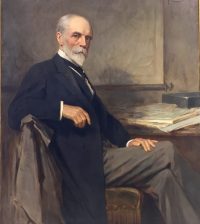We began quite early this morning the further consideration of our reply to the Spanish Commissioners, really intending only to read for slight verbal corrections, and finish as rapidly as read to the typewriters. Senator Gray protested strongly against a phrase which Judge Day had used in a part of his response, where he spoke of “this perversion of facts.” Both Davis and Frye sustained the language as exactly | justified by what the Spaniards had said; but it was finally agreed to use a softer phrase.
By this time it was evident that the typewriters would find it impossible to complete the paper in time for a meeting by two o’clock, and the secretary [Moore] accordingly sent a note to Ojeda of the Spanish Commission referring to their offer at the last adjournment of as much more time as we wanted, and explaining that as the copyists could not complete the fair copy of our paper in time, we should be glad to hold the meeting . . . at 4 o’clock in the afternoon instead of two. Their reply was to the effect that expecting only a short meeting at two, they had made engagements for the rest of the afternoon, and would therefore prefer to have the meeting postponed until two on the following day. Their excuse seemed to us improbable, but there was nothing to be done but to accept the delay which they obviously desired for the purpose of hearing the election news [from the United States, which they expected to be] unfavorable to the administration. . . .
Count Münster made a long call in the evening. He began by asking about the reported explosion under the Supreme Court rooms in Washington. [He] then referred to the newspaper announcements that we were to meet today [and] inquired whether we had done anything very important. It was evident that this was the purpose of his call, and that he probably considered that the expected meeting today would be the turning point in the negotiations on the Philippines. I explained the delay, and he then talked about the protocol, which he said he had read. He was inclined to believe that it sustained the Spanish view. I thereupon got our official copy of it, and called his attention to both the English and [the] French text. He then fastened on the word “disposition,” saying that it would have been better to leave the original word “possession,” since it was best in diplomacy, and especially in precise matters like treaties and protocols, to say the exact thing that was meant. He predicted that we would have a good deal of trouble out of it. He was evidently curious about the Philippines, and I finally thought it best to talk with some frankness. I showed him the map and explained why any division of the Philippines was difficult and unnatural. [I] dwelt on the duty which the fortunes of war had unexpectedly imposed upon us with regard to these Philippine insurgents. [I] said that it was evident now that it would make less trouble for the rest of the world, and involve us in little more, to take the whole group instead of leaving a part of it as a fire brand for Europe. The Count said on this part of the subject: “We certainly don’t want them; at least I don’t want them, and I hope my government does not.”
